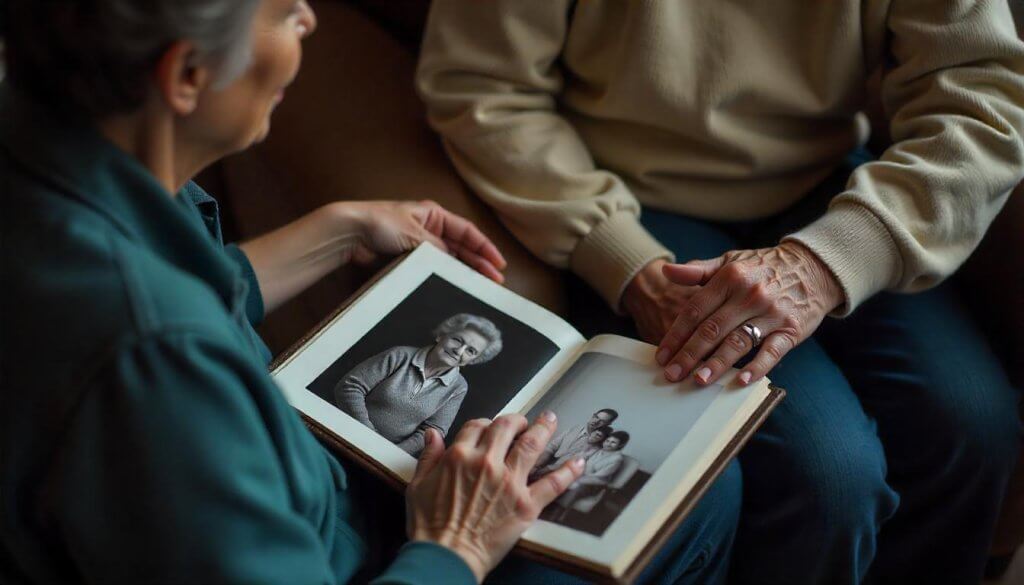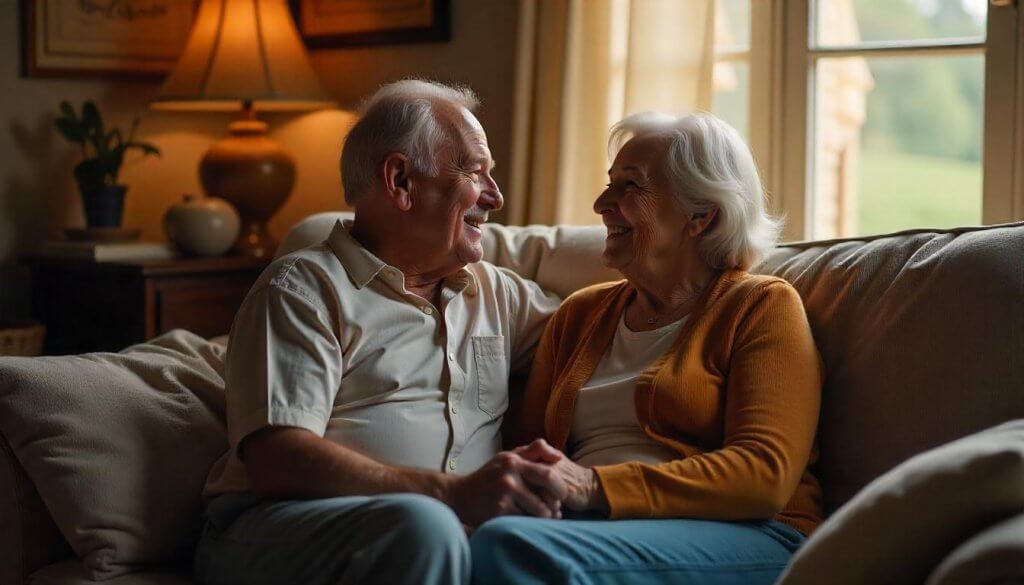Bir hayat arkadaşının kaybı, derin bir acı ve yönelim bozukluğu deneyimidir. Kişinin dünyasının temelini paramparça eder ve doldurulması imkansız görünen bir boşluk bırakır. Bu muazzam zorluğun üstesinden gelenler için Eşini Kaybeden İlerliyorBu yolculuk unutmak ya da değiştirmekle ilgili değildir. Bunun yerine, karmaşık bir keder, iyileşme ve nihayetinde gidene duyulan sevginin kalpte yol gösterici bir ışık olarak kaldığı bir yolu yeniden keşfetme sürecidir.
Gerçekten de bir eşin ölümü, bir insanın yokluğundan çok daha fazlasını temsil eder. Paylaşılan bir geçmişin, birlikte hayal edilen bir geleceğin ve çoğu zaman kişinin kendi kimliğinin önemli bir kısmının kaybı anlamına gelir. Önünüzdeki yol ürkütücü olsa da, yeniden anlam, bağlantı ve hatta neşe bulmak mümkündür. Bu makale, eş kaybından sonra yaşanan yasın kendine özgü doğasını incelemekte, sağlıklı başa çıkma mekanizmaları önermekte ve anlamlı bir geleceği dikkatlice yeniden inşa ederken kaybedilen aşkı onurlandırmak için stratejiler sunmaktadır. İlerlemenin aşkınızı geride bırakmak anlamına gelmediği vurgulanmaktadır.
Eş Kaybının Eşsiz Yasını Anlamak
Keder son derece kişisel bir deneyimdir, ancak eşini kaybetmenin yarattığı keder ayrı bir ağırlık taşır. Anlık üzüntünün çok ötesinde, bireyleri birçok düzeyde etkiler.
Birincisi, bu sadece bir kişinin kaybı değil, derin bir kimlik kaybıdır. Uzun yıllar boyunca kişinin kimliği bir koca, eş ya da partner olmakla iç içe geçmiştir. Bu rol aniden sona erdiğinde, "Şimdi ben kimim?" veya "Amacım ne?" soruları kaçınılmaz olarak ortaya çıkar. Bu durum kafa karıştırıcı bir benlik duygusuna yol açabilir.
Ayrıca, eşler arası yasın önemli bir bileşeni de ortak geçmişin ve geleceğin kaybedilmesidir. Ayrılan kişinin dahil olduğu büyük ya da küçük tüm planlar aniden yok olur. Buna günlük rutinler, gelecekteki seyahat hayalleri ve hatta dile getirilmeyen düşüncelerinizi anlayan birinin basit arkadaşlığı da dahildir. Yokluk, tanıdık alışkanlıkların veya seslerin eskiye duyulan özlemi tetiklediği "hayalet" bir varlık olarak ortaya çıkabilir. Bu yaygın yalnızlık hissi bunaltıcı olabilir.
Yas için sabit bir zaman çizelgesi efsanesi de iyileşmeyi zorlaştırır. Toplum bazen bireylerin belirli bir süre içinde "hayatlarına devam etmelerini" bekler. Ancak yas doğrusal değildir. Yıllar sonra bile beklenmedik bir şekilde geri dönen yoğun duygu dalgaları ile inişli çıkışlıdır. Çok çeşitli duygular yaşamak normaldir: yoğun üzüntü, ezici öfke, derin suçluluk ve hatta beklenmedik rahatlama anları. Bu karmaşık duygular sürecin doğal bir parçasıdır. Bu benzersiz karmaşıklığın farkına varmak, bu sürecin ilk adımıdır. Eşini Kaybeden İlerliyor şefkatle.
Yasın İlk Aşamalarında Gezinme
Bir eşi kaybetmenin hemen ardından genellikle bir şok ve hissizlik hali yaşanır. Bu ilk dönem, sanki bir rüyanın içinden geçiyormuşsunuz gibi gerçeküstü gelebilir.
İlk günler ve haftalar boyunca pek çok kişi koruyucu bir duygusal körelme yaşar. Bu durum, cenaze düzenlemeleri gibi pratik işlerin üstesinden gelmelerini sağlar. Ancak bu hissizliğin altında genellikle yoğun bir acı ve özlem yatar. Bu duygusal acı fiziksel olarak kendini gösterebilir; yorgunluk, iştah değişiklikleri veya uyku bozukluklarına neden olabilir. Dünya daha boş hissedilir ve evin her köşesi anıları tetikleyerek ölen kişiye duyulan özlemi körükleyebilir.
Dahası, günlük yaşam düzensizliğe ve kaosa dönüşebilir. Yıllar boyunca oluşturulan rutinler aniden kaybolur. Daha önce ortak sorumluluklar olan ev işlerini, mali durumu ve kişisel işleri yönetmek artık yalnızca bir kişiye düşer. Bu pratik yük, ezici duygusal acıyla birleştiğinde, basit görevleri devasa hale getirebilir. Bu dönem muazzam bir öz şefkat gerektirir. Aynı zamanda, temelden değişmiş bir hayatın parçalarını yavaş yavaş toplamaya başlarken sabırlı olmanızı gerektirir. Bu yolculuk Eşini Kaybeden İlerliyor burada, bu ham ve zor anlarda başlar.
İyileşme için Sağlıklı Başa Çıkma Mekanizmaları
Eş kaybının acısı aceleye getirilemez veya önlenemezken, sağlıklı başa çıkma mekanizmaları iyileşme sürecini kolaylaştırabilir. Bu stratejiler inanılmaz derecede zor bir dönemde destek ve yapı sağlar.
Her şeyden önce, kendinize tam anlamıyla yas tutma izni verin. Acının kestirme yolu yoktur. Duyguları bastırmak sadece iyileşme sürecini uzatır. Kendinize ağlamak, öfkelenmek ya da sadece üzüntünüzün içinde hareketsiz kalmak için izin verin. İkinci olarak, destek arayın ve kabul edin. Arkadaşlar, aile ve profesyonel destek grupları paha biçilmez bir duygusal teselli ve pratik yardım sunar. Duygularınızı sizi anlayan başkalarıyla paylaşmak yalnızlık hissini hafifletebilir. Terapi veya danışmanlık, karmaşık duyguları işlemek ve başa çıkma stratejileri geliştirmek için güvenli bir alan sağlar.
Ayrıca, kişisel bakıma öncelik vermek çok önemlidir. Yas, beden ve zihin üzerinde muazzam bir etki yaratır. Temel fiziksel sağlığa odaklanın: yeterli uyumaya çalışın, besleyici beslenme alışkanlıklarını sürdürün ve hafif fiziksel aktivitelerde bulunun. Kısa bir yürüyüş bile kafanızı boşaltabilir. Duyguları çeşitli yollarla ifade etmek de faydalıdır. Günlük tutmak, açıkça konuşmak veya sanat ya da müzik gibi yaratıcı uğraşlarla meşgul olmak, söze dökülmesi zor olan duyguların işlenmesine yardımcı olabilir. Son olarak, küçük de olsa yeni rutinler oluşturmak, kaos gibi hissedilen durumlarda bir yapı hissi yaratabilir. Bu, günlük yaşamda kontrol ve öngörülebilirlik hissinin geri kazanılmasına yardımcı olur. Bu mekanizmalar aşağıdakileri yapmaya kararlı olanlar için hayati önem taşır Eşini Kaybeden İlerliyor Düşünceli bir şekilde.
Sevdiklerinizi ve Onların Anısını Onurlandırmak
Eşinizi kaybettikten sonra ilerlemek, onların varlığını silmek veya paylaştığınız sevgiyi azaltmak anlamına gelmez. Bunun yerine, onların anısını onurlandırmak ve ruhlarını kalbinizde canlı tutmak için anlamlı yollar bulmayı içerir.
Anma törenleri veya ritüeller oluşturmak son derece iyileştirici olabilir. Bu, onların anısına bir ağaç dikmeyi, adlarına bir burs oluşturmayı veya evinizde onların fotoğrafları ve değerli eşyalarıyla özel bir yer oluşturmayı içerebilir. Doğum günlerinde bir mum yakmak veya önemli bir yeri ziyaret etmek gibi ritüeller rahatlık ve hatırlamak için somut bir yol sağlayabilir.
Dahası, hikayeleri paylaşarak anıları canlı tutmak güçlüdür. Sevdiğiniz kişi hakkında arkadaşlarınızla ve ailenizle konuşun. Eski fotoğraf ve videolara bakın. Anekdotları anlatmak onların mirasını güçlendirmeye yardımcı olur ve etkilerinin devam etmesini sağlar. Birçok insan, ölen eşlerinin gurur duyacağı bir şekilde yaşamanın rahatlığını bulur. Bu, paylaştığınız bir hayalin peşinden gitmeyi, sevdikleri bir geleneği sürdürmeyi veya hayatlarının merkezinde yer alan değerleri somutlaştırmayı içerebilir.
"Devam eden bağ" kavramı da önemlidir. Bu, merhumla manevi veya duygusal bir bağın sürdürülmesini içerir. Bu, keder içinde sıkışıp kalmak anlamına gelmez. Aksine, sevginin fiziksel varlığın ötesine geçtiğini kabul eder. Onların varlığını hissetmeye devam edebilir, hatıralarından güç alabilir ve hatta onlarla içsel bir diyaloğa girebilirsiniz. Bu kalıcı bağ rahatlık sağlar ve sevginin asla gerçekten ölmediğini pekiştirir. Bu pratikler, sevgi yolculuğunun merkezinde yer alır. Eşini Kaybeden İlerliyor.
Kimliği Yeniden İnşa Etmek ve Hayatı Yeniden Tanımlamak
Bir eşi kaybetmek, kişinin kimliğini derinlemesine yeniden değerlendirmesini zorunlu kılar. Buradaki zorluk, evlilik rolünden bağımsız olarak bir birey olarak kim olduğunuzu yeniden tanımlamakta yatar.
"Ben şimdi kimim?" sorusu her yere yayılmış durumda. Hayatınızın birçok yönü bir çiftin parçası olmakla tanımlandı. Şimdi, bireysel benliğinizi yeniden keşfetmeniz gerekiyor. Bu genellikle evlilik veya ortak yaşam sırasında bir kenara bırakılmış olabilecek bireysel ilgi alanlarının ve hobilerin yeniden keşfedilmesini içerir. Eski bir tutkuyu yeniden ele almak ya da yeni bir tutkuyu keşfetmek bir amaç duygusu ve kişisel tatmin sağlayabilir.
Ayrıca, yeni bağlantılar kurmak hayati önem taşır. Bu, mevcut arkadaşlıkları güçlendirmeyi veya yeni insanlarla tanışmak için cesurca uzanmayı içerebilir. Kulüplere, gönüllü gruplara veya toplum kuruluşlarına katılmak, sosyal katılım ve aidiyet duygusu için fırsatlar sağlayabilir. Sosyal hayata uyum sağlamak özellikle zorlayıcı olabilir. Özellikle bir zamanlar çift olarak katıldığınız sosyal etkinliklere tek başınıza gitmek cesaret gerektirir. Küçük adımlarla başlamak ve kendi hızınıza göre yavaş yavaş yeniden katılım sağlamakta bir sakınca yoktur.
Nihayetinde amaç, evlilik rolünün ötesinde yeni bir amaç ve anlam bulmaktır. Bu, yeni kariyer yolları, savunuculuk çalışmaları veya sadece kişisel gelişime zaman ayırmayı içerebilir. Bu süreç sevdiğiniz kişiyi unutmak değil, onun anısını onurlandıran ve aynı zamanda varlığınızın devamını kucaklayan zengin ve anlamlı bir yaşam inşa etmekle ilgilidir. Bu aktif süreç başarılı olmanın anahtarıdır Eşini Kaybeden İlerliyor.
Yeni İlişkiler Sorunu
İşin en hassas ve kişisel yönlerinden biri Eşini Kaybeden İlerliyor yeni ilişkiler meselesidir. Yeniden biriyle çıkmayı düşünmek için "doğru" bir zaman yoktur. Zamanlama her bireye özgüdür.
Suçluluk ve sadakat duyguları son derece yaygındır. Birçok dul kadın ve dul erkek, hayatlarına devam etmenin ölen eşlerinin onurunu zedeleyeceğinden ya da ihanet olarak algılanacağından endişe eder. Yeniden arkadaşlık veya sevgi aramanın doğal bir insan arzusu olduğunu ve paylaştığınız sevgiyi azaltmadığını anlamak önemlidir. Yas danışmanları sıklıkla sevginin sınırlı değil, geniş kapsamlı olduğunu vurgular.
Kayıptan sonra flört etmek benzersiz zorluklar sunar. Kendinizi pratikten uzak hissedebilir veya önceki ilişkinizle kıyaslama yapmakta zorlanabilirsiniz. Yeni partnerlerin geçmişinizi ve kaybettiğiniz eşinize duyduğunuz kalıcı sevgiyi anlaması gerekir. Aileniz ve arkadaşlarınızla yeni ilişkiler hakkında açık bir şekilde iletişim kurmak da zor olabilir, çünkü devam etme süreciniz hakkında kendi beklentileri veya duyguları olabilir.
Nihayetinde, odak noktanız toplumsal baskı veya dış beklentiler değil, kendi hazır olma durumunuz olmalıdır. Kendinizi yeni bağlantılar keşfetmeye duygusal olarak hazır hissettiğinizde ve bunu gerçek bir arkadaşlık arzusuyla yaptığınızda, işte o zaman sizin için doğru zaman gelmiş demektir. Bu, kaybedilenin yerine yenisini koymakla değil, size neşe ve destek getiren bir bağlantı bulmakla ilgilidir.
Uzun Vadeli Büyüme ve Dayanıklılık
Yas, acı verici olsa da aynı zamanda dönüştürücü bir süreç olabilir. Bu yolculuk Eşini Kaybeden İlerliyor genellikle beklenmedik güçlü yönlere ve derin kişisel gelişime yol açar.
Birçok kişi yeni bir dayanıklılık ve bağımsızlık duygusu keşfeder. Hayatın daha önce hiç zorunda kalmadıkları yönlerini yönetmeyi öğrenir ve başa çıkma becerilerine güven duyarlar. Bu zorlu deneyim empatiyi derinleştirebilir ve hayatın kırılganlığı ve kıymeti konusunda benzersiz bir bakış açısı sağlayabilir.
Ölen eşe duyulan sevgi yok olmaz; sadece biçim değiştirir. Devam eden bir varlık, yol gösterici bir ışık ve kişinin kimliğinin değerli bir parçası haline gelir. Suçluluk duymadan yeniden neşeyi bulmak önemli bir dönüm noktasıdır. Eşinizin sevgisini ve anılarını hala kalbinizde taşırken mutluluğu kucaklayabileceğinizi gösterir. Bu onları unutmak anlamına gelmez. Bu, onların anılarını gelişmeye devam eden bir hayata entegre etmek anlamına gelir. En derin kayıplardan sonra bile kalbinizde sevgiyi taşıyarak dolu ve anlamlı bir hayat yaşayabilirsiniz.
Sonuç
Yolculuğu Eşini Kaybeden İlerliyor bir bireyin üstlenebileceği en zorlu yollardan biridir. Bu, insan bağının derinliğinin ve sevginin kalıcı gücünün bir kanıtıdır. Derin bir keder ve zorlu duygusal ve pratik ayarlamalarla işaretlenmiş olsa da, bu bir unutma yolculuğu değil, acıyı amaca dönüştürme yolculuğudur.
Öz şefkati benimseyerek, gerekli desteği arayarak ve kaybettiğiniz aşkınızı onurlandırmanın anlamlı yollarını bularak, bu geçişi güç ve zarafetle atlatabilirsiniz. Unutmayın ki aşk asla gerçekten ölmez; bunun yerine dönüşür ve kim olduğunuzun silinmez bir parçası haline gelir, kalbinizde sonsuza dek sevgiyle cesurca ilerlerken önünüzdeki yol için yol gösterici bir ışık olur.













